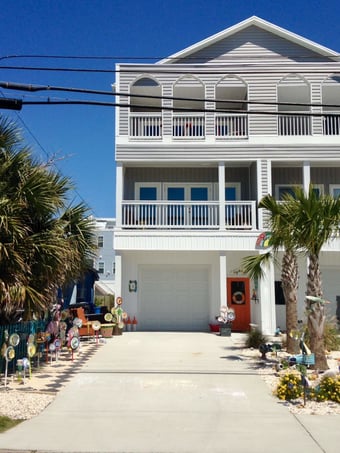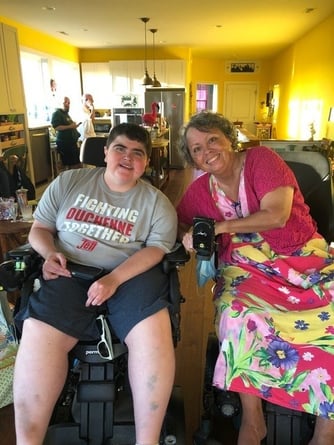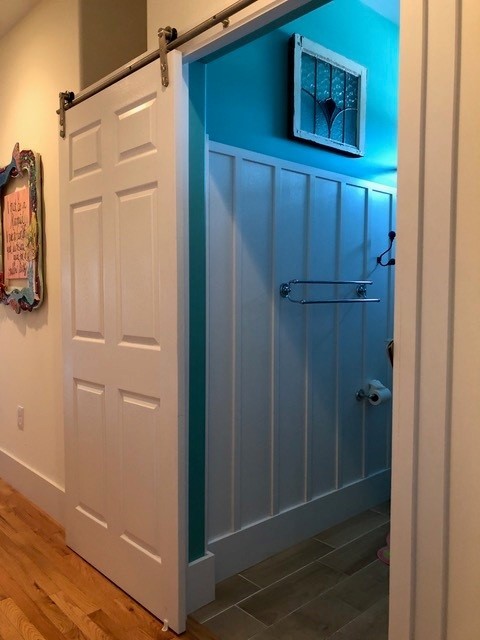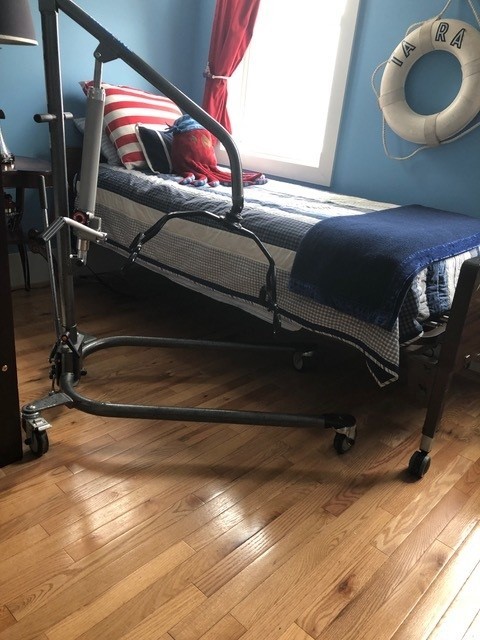The Christopher & Dana Reeve Foundation is partnering with Airbnb to help expand travel options for people living with paralysis.
Interested in hosting and sharing your space with accessibility features? Learn more.
As a young girl, the extent of Lorraine’s travels consisted mostly of trips to regional medical centers within driving distance of her Arkansas home. Lorraine, 59, was diagnosed with muscular dystrophy as a toddler and grew up in an era when a lack of accessibility made affordable vacation opportunities scarce.

By the time her sons were born in the mid-90s, the U.S. was starting to change, with accessibility features beginning to be incorporated into more public and private spaces.
Lorraine was eager to give her boys, who also had muscular dystrophy, the experiences she’d never known. The young family hit the road, driving from their home in North Carolina to destinations like Disney World and New York City.
But she soon realized there were still challenges in finding options that could meet her family’s needs. Accessible transportation options remained limited, especially for a family using three wheelchairs. Hotel beds were too low for easy transfers and bathtubs with high sides were the norm, not the roll-in showers that could accommodate her family.
“Eventually, we kind of gave it up and just didn’t travel anymore,” she says. “We found other ways to fill our time.”
They built the boys a fantastic clubhouse and made their home a place of game nights, pizza parties and celebrations. It was, without a doubt, a happy life.
Yet, the sense that her family had missed out on some memories stuck with her. In 2014, while attending a wedding in a nearby beach town, inspiration struck: Why not create the kind of vacation venue for other families that she’d wanted for her own?
With its launch in 2007, Airbnb gave travelers a new kind of freedom -- and empowered Hosts like Lorraine who were determined to make guests with disabilities a priority rather than an afterthought.
Lorraine’s property, listed on Airbnb in 2015, featured everything she hoped would help make vacations more accessible for all guests, from lever handled faucets and a roll-under sink to an electric hospital bed and a portable toilet seat. The floors are wood, the doorways 36-inches wide and a master bathroom contains an enormous roll-in shower with handheld faucets and a shower seat.
 Judging by a calendar brimming with reservations booked a year in advance, the Superhost has succeeded. Lorraine estimates that about 80 percent of her guests are families and individuals living with disabilities who travel to her Carolina Beach property from as far as Michigan, California, and Canada.
Judging by a calendar brimming with reservations booked a year in advance, the Superhost has succeeded. Lorraine estimates that about 80 percent of her guests are families and individuals living with disabilities who travel to her Carolina Beach property from as far as Michigan, California, and Canada.
Lorraine praised Airbnb’s recently revamped search feature which includes more than a dozen accessibility filters, from bathroom grab bars and wide doorways to step-free pathways. It is, she says, a stark contrast to other sites that offer only a general “wheelchair accessible” filter that she thinks leads to travelers with disabilities spending “three times the amount of effort looking for a property.”
“It’s encouraging for me as a Host and as an advocate to see the direction that Airbnb is going in having an inclusive community because I’m not seeing that same effort on other platforms,” she says. “Airbnb has filters that nobody else has. They have taken on a leadership role in this way.”
Lorraine recently launched Becoming rentABLE to spotlight accessibility-specific renovations of rental properties around the country; she’s in the process of pitching the idea to television networks.
“To make change, we have to provide education,” she says. “People don’t understand what the needs are.”
In the meantime, she continues to try and persuade fellow Airbnb Hosts that it’s not only good business sense to adapt and expand properties for inclusivity --“You’re leaving money on the table if you don’t identify the accessibility features you have” -- but also the ultimate reward.
“My greatest joy is experiencing these families having this time together,” she says. “It is the coolest thing ever to know that a family might not have been able to create those memories if it weren’t for your property.”

Tips for Hosts on how to make their space more inclusive for guests with mobility needs
Entries and doorways
- Add portable ramps where steps or raised thresholds prevent access. Many options cost less than $200 and can be folded up for easy storage when not in use.
- Consider offset or expandable hinges for narrow doorways. This hardware allows the door to swing completely off the frame, rather than inside of it, providing a couple extra inches for wheelchair users.
- Swap doorknobs for lever or pull handles that are easily operated with one hand and do not require grasping or twisting.
- Replace traditional keys -- which can be difficult to hold and maneuver -- with smart or electronic locks; make sure to install between 34” and 42” from ground for best access.
Bathrooms
- Install grab bars in the shower and on the walls behind and to the side of the toilet.
- Provide an accessible shower chair -- an inexpensive item that can be folded and stored when not in use.

Bedrooms and Living areas
- Arrange furniture to create wide open spaces. Remove coffee or side tables that create narrow or limited access.
- Install lever or pull handles on cabinets and drawers for easy access.
- Install multilevel shelving or hanging rods in closets.


 Judging by a calendar brimming with reservations booked a year in advance, the Superhost has succeeded. Lorraine estimates that about 80 percent of her guests are families and individuals living with disabilities who travel to her
Judging by a calendar brimming with reservations booked a year in advance, the Superhost has succeeded. Lorraine estimates that about 80 percent of her guests are families and individuals living with disabilities who travel to her 
